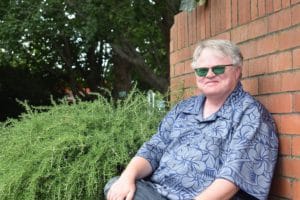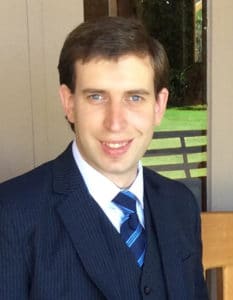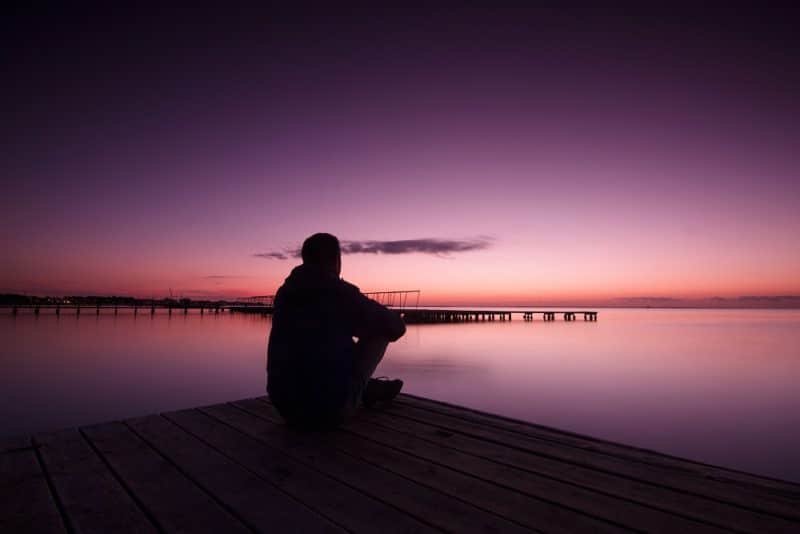Two Catholics, a priest and a lay woman, share their mental health journeys towards a better life.
One night, towards the end of August, 2016, then Thames-Coromandel parish priest Fr James Mulligan had a complete breakdown.
“I was actually wheeled out of Thames. I had no choice,” he said. “The bishop rightly said, ‘well, I’ve got to get you out of there. I was asking you for a long time now if you were doing ok. You always seem to say you were alright, but you weren’t really’.”
Fr Mulligan’s mental illness stemmed from a traumatic experience in the past that went unresolved for more than 30 years.
“In my case, on the 18th of April 1991, my mother took her own life. It’s not something that I share very often. Few people in the parish know [and] it’s generally people whom I trust. I had issues that I was doing such a good job of repressing for so long,” he said.

Fr James Mulligan believes he has come a long way in four years.
Fr Mulligan said there were things niggling in the back of his mind, but he ignored them. He thought he could “muscle my way through” his past, as well as the present stress of parish life, driving back and forth between Thames and Coromandel, and the isolation.
“There were things in the past that I hadn’t properly put to bed or tears that I should have cried, but I didn’t,” he said.
It was only when the proverbial “soft, brown stuff” hit the fan that he was forced to reach out.
“I had this huge panic attack. It was like falling into this huge blackness, wondering what do I do now?” he said.
“It was hell. No one needs to tell me that hell exists because it was like . . . a deep, dark hole,” he added. “I think I have an understanding of what hell is or at least what hell was like at that time for me.”
Mental illness is real
One in four adults in New Zealand have experienced mental distress, according to Statistics NZ, and researchers say the rate of mental illness, not just the reporting of it, is genuinely rising.

Michael Hempseed
Behavioural expert Michael Hempseed told NZ Catholic that people tend to be sceptical about mental illness, but studies show it causes real changes in the brain and the body.
“There is a part of your brain called the hippocampus, one of the parts of the brain that’s responsible for memory and emotion. We’ve found that when someone develops mental illness or depression, that part of the brain can shrink by up to 17 per cent,” he said.
Christchurch-based Mr Hempseed is the author of Being A True Hero: Understanding and Preventing Suicide in Your Community, a book being used by the New Zealand Police, emergency services, GPs and counsellors. He gained an honours degree in psychology from the University of Canterbury in 2008.
“This is not an imaginary illness. There are very real changes that happen. The good news is that when people get treatment, sometimes by medication, sometimes by counselling, those changes usually go back,” he said.
Mr Hempseed explained there is no one cause that can trigger depression. There are usually many reasons that can lead to a breakdown, for instance, in Fr Mulligan’s case, a significant childhood trauma and isolation.
“We know that human beings are made to connect with God and with each other and yet, as a culture, we are becoming more and more isolated, we are spending less and less time interacting with one another,” Mr Hempseed said.
Michelle’s story

Michelle Carshalton
Mother-of-five Michelle Carshalton from Rangiora was afflicted with obsessive/compulsive disorder about 13 years ago.
“I’ve always had the sort of personality or disposition that tends towards potentially having mental health issues. I’ve always been more pessimistic and introverted, and there were lots of events in my life, like bullying and all sorts of things that chipped away at my resilience,” she said.
Something happened in her early 20s that shook her not-too-strong foundation.
“There was an event in my early 20s that challenged my perception of black and white in people. That good people can do bad things or bad people can do good things,” she said. “I prefer to keep it black and white. Good people do good things. Bad people do bad things.”
She said she spiraled into anxiety.
“I was questioning myself whether I was good or bad. From there, I developed a lot of intrusive thoughts and obsessive thoughts and a lot of mental rituals that went with it,” she said. “At that time, I didn’t know that could be called obsessive/compulsive disorder.”
Unlike Fr Mulligan, though, Mrs Carshalton recognised that she needed help.
‘It was fairly easy to know [that I needed help] because I was very stuck in my mind. My thoughts were very obsessive. They were hard to move away from. I was feeling very distressed. I knew I needed to see someone and find out what I can do to feel better so I can get some relief,” she said. “It wasn’t a hard decision to know I needed help, but it took a lot of time to find the right help.”
It’s ok to ask for help
Not everyone, though, knows how to ask for help. Fr Mulligan said he thinks people in ministries or professions that help are “the world’s worst at receiving help”.
He said they (including himself) tend to build tall pointy glass towers of idealism and perfection which will, at some point in time, collapse.
Fr Mulligan noted that priests are particularly bad at self-care. Looking back, he said sleep deprivation, not eating well and not exercising contributed to his breakdown.
“I thought I was handling things well, but I was actually sliding into [depression]. I think, I was sliding into it for at least a good two years, before I had no choice but to reach out,” Fr Mulligan reflected.
He initially thought admitting to being depressed is a sign of weakness. He learned since then that “it’s ok to talk about stuff”.
“Especially when there are going to be days that I’m not feeling so flash or there could be particular stressors sometimes within parish life,” he explained.
“I think also about having to deal with conflict as well, how to respect myself, also how to respect others and how to respectfully disagree with others as well. I think, a lot of it, for me, a lot of it had been a big learning curve as well in terms of my assertiveness, and just what the shrinks call ‘self-agency’. I am currently still on a little bit of medications.”
How to spot depression in others
Mr Hempseed said one thing that should be made clear is that feeling a bit flat or a bit down because one had a bad day at the office is not a sign of mental illness.
“What you are looking for is a significant negative change in someone’s behaviour,” he stressed.
“It turns to mental illness when it starts to significantly affect your life.”
Mr Hempseed said some examples would be significant changes in sleeping (sleeping too much or not enough) or in eating patterns.
“Or you are just feeling absolutely miserable. Sometimes, depression can come with difficulty in concentrating. Some people with depression, they don’t feel sadness, they feel numbness,” he said. “Another way depression can come out is through anger and irritability. We get angry from time to time, but if someone has depression, they often get upset all the time over little things.”
Fr Mulligan said that a person with depression would usually be the last to know, as in his case.
“I had to reach a crisis situation before anyone could intervene,” he said.
On the other hand, Mrs Carshalton said she wasn’t embarrassed to seek help.
“I was concerned that I would not get the help that I needed, because it felt so complicated and intense in my mind that I worried that nothing would really help. That nothing would really solve my problem,” she said.
There is help
Mr Hempseed said people living with depression need to know that there is help. Mental illness is manageable, if not curable, he said.
“We live in an exciting time, because there are so many treatments out there. Even a few years ago, we used to think that a majority of mental illness was something that was untreatable, and people would just have to live with it. There are so many new treatments coming out. There are lots of different ways to help people. If the first doesn’t work, there’s other techniques to try,” he said.
In New Zealand, there are about 5000 social services that one can get in touch with.
“Sometimes, people with depression are just so overwhelmed they don’t know where to start. If that’s you, I would really encourage you to go see your doctor. A doctor should be able to make an assessment and then decide what sort of help you might need to point you in the right direction,” he said.
Since her first episode 13 years ago, Mrs Carshalton said she has had to deal with bouts of depression five times.
“The hormones of pregnancy seem to exacerbate my anxiety, so after having my baby, I didn’t have any significant issues,” she said.
Mrs Carshalton said she has learned a lot of Cognitive Behavioural Therapy (CBT) strategies from her own research, which she uses to manage her mental health issues.
“It was a combination of things . . . like learning strategies to deal with anxiety, learning my triggers [and] going on meditation,” she said.
She said her husband had been supportive, but they have both learned that merely talking about it is not enough, even as she encouraged people to be open about their affliction.
“When you are in that really dark place of anxiety and depression, hearing someone else’s story is nice, but it doesn’t necessarily make you feel like your story is going to end differently to how you feel now. But I think having been through significant relapses, I have always come to a better place after,” she said.
“It is scary. When you are in that place, you are in darkness. I can’t describe enough how isolating and lonely it feels in that place. It’s just an awful place to be that you need to grasp on a string of hope. You need to see your doctor and you need to seek comfort from Our Lord in whatever way you can,” she said.
Road to recovery
Fr Mulligan said he believes he has come a long way since that night in August four years ago.
“The path is really good. Sometimes, there is going to be the odd shaky moment, the odd shaky day,” he said.
“But I always remind myself that, well, I’ve been in this place before and that it’s ok and not simply focus on myself, but be part of an active community, too, where I can actually use my experience as an asset instead of looking at it as a source of shame,” he added.
Fr Mulligan still sees a clinical psychologist once every six weeks, a psychiatrist once every two months and takes medication.
He reckons he has accepted some things as part of “normal” life, however one defines that word.
“I guess, it’s a bit like alcoholics, they would say they’re recovering. They wouldn’t say they are fully recovered,” he said.
He said he is still learning to stand on his own socially, psychologically and spiritually, and at the same time, acknowledge his vulnerabilities.
 Faith and depression
Faith and depression
Both Fr Mulligan and Mrs Carshalton fell back on their faith in the darkest moments of their lives.
Fr Mulligan pointed out Jesus revealed his humanity “even to the extreme vulnerability to the point of the cross”.
“In a way, we all have to come to that point. It’s like God can only get at us . . . when we are really, truly in that dark place,” he reflected, citing the experiences of St Teresa of Avila and St John of the Cross.
“I suppose the average person, especially if they are people of faith, they might think, you know, you lack trust in God if you admit to depression. But I think looking back over my experience, I would call it God’s calling card, really. God does not orchestrate these sufferings on purpose. But God can still use these circumstances for a greater good,” he said.
Fr Mulligan said he is grateful to be able to be a part of parish life again as assistant priest of St Mary’s in Papakura.
Mrs Carshalton said her faith had helped her resiliency.
“I’ve never thought that because I got this, God doesn’t love me. I have been able to see that this is my cross to carry. Everyone has a cross to carry and this is just my particular one,” she said.
“Our Lord experienced significant sufferings, and . . . the saints experienced significant sufferings and mental anguish . . . is not a new affliction. You are not the only person to suffer in this way. You should be open to sharing it with others, because you are probably going to find a whole lot more people who have encountered the same suffering who want to help,” she said.
Mrs Carshalton said when she had her last episode, she had the support of her husband, who took care of their children, and looked after her. She also had help from people in her parish, who made their meals. She said this really took the pressure off her, allowing her to see her priest, doctor and counsellor.
As a result, it was the shortest episode she had, lasting only a couple of weeks.
“We need to work really hard in parishes to be able to create those connections with people so that, when the time comes, they will be able to naturally turn [to the parish] for support,” she said.
Fr Mulligan said the Church tends to focus on people’s spirituality, so that other areas of human wellness may be neglected.
“I would suggest that the Church needs to do a lot more to address the psychological impact of Covid and other major events,” he said.
Mr Hempseed agreed.
“If we really want to live out the Gospel, try to spend time with those who are vulnerable and struggling,” he said. “I think if Christ was alive today, he would spend time with people with mental illness. They are the people who need Christ’s love the most. And, as a Church, that’s who we should be reaching out to.”
He proposed the running of carefully-planned events that would raise awareness about mental illness and the help that is available, “ideally with a Catholic world view”.
“I must emphasise we need people that really know what they are doing to run events. Unfortunately, I have seen well-meaning people get out of their depth. We must not be afraid to use and seek out secular resources as an addition to the wealth of expertise the Catholic Church has,” he said.
Lessons
Fr Mulligan said he speaks about his mental health issues “not to be pitied”, but to be able to help.
He said there are three things that he reminds himself of every day.
“First of all, I don’t have to save the world because the world has already been saved through Jesus,” he notes with a chuckle, reminding himself of what should be obvious.
The second is authenticity. “Life is not simply about doing good, but about being real,” he said.
And the last is about taking time.
“Life is not just about doing, but about being, taking the time to be, which I’ve had a lot of practice at during the lockdowns,” he said.
He said people shouldn’t feel guilty about just “being”. “Maybe God is even more in the midst when maybe there doesn’t seem to be a whole lot going on,” he said.

Reader Interactions